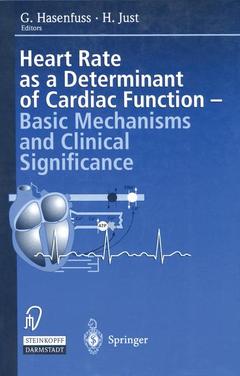Heart rate as a determinant of cardiac function, Softcover reprint of the original 1st ed. 2000 Basic mechanisms and clinical significance
Langue : Anglais
Coordonnateurs : Hasenfuss G., Just H.

In a variety of cardiac diseases the influence of heart rate on cardiac function is altered and both heart rate and heart rate variability are of great relevance for the prognosis of cardiac patients. This book provides a summary of the current knowledge on the influence of heart rate on myocardial function and hemodynamics in non-failing and failing animal and human hearts. The subcellular and molecular alterations underlying the altered heart rate response in heart failure are discussed in detail. In addition, studies related to the impact of heart rate and heart rate variability on arrhythmogenesis and prognosis in patients with cardiac diseases are critically reviewed. Finally, the relevance of heart rate control by therapeutic interventions is also discussed. The book contains 19 different chapters written by well-known experts in this novel and clinically important field.
Regulation of heart rate.- Physiology and pathophysiology of baroreceptor function and neuro-hormonal abnormalities in heart failure.- Heart rate and myocardial function.- A mechanistic analysis of the force-frequency relation in non-failing and progressively failing human myocardium.- Post-rest contraction amplitude in myocytes from failing human ventricle.- Influence of SR Ca2+-ATPase and Na+-Ca2+-exchanger on the force-frequency relation.- Force-frequency relations in nonfailing and failing animal myocardium.- Influence of stimulation frequency on subcellular systems.- Heart rate as a determinant of L-type Ca2+ channel activity: Mechanisms and implication in force-frequency relation.- Electrophysiological aspects of changes in heart rate.- Influence of Forskolin on the force-frequency behavior in nonfailing and end-stage failing human myocardium.- Modulation of the force-frequency relation.- Effect of inotropic interventions on the force-frequency relation in the human heart.- Effects of cytokines and nitric oxide on myocardial E-C coupling.- Relevance of heart rate on hemodynamics and energetic.- Adrenergic regulation on the force-frequency effect.- Influence of left ventricular pressures and heart rate on myocardial high-energy phosphate metabolism.- Force-frequency relation in patients with left ventricular hypertrophy and failure.- Prognostic relevance of heart rate.- Heart rate variability and electrical stability.- Rate-dependence of antiarrhythmic and proarrhythmic properties of class I and class III antiarrhythmic drugs.- Autonomic control of heart rate: Pharmacological and nonpharmacological modulation.- Therapeutic relevance of heart rate control.- Left ventricular restoring forces: Modulation by heart rate and contractility.- Beta-blocker treatment in heart failure. Role of heart rate reduction.- Digitalis therapy — Relevance of heart rate reduction.- ?-Blocker treatment of chronic heart failure with special regard to Carvedilol.
Date de parution : 03-2012
Ouvrage de 275 p.
17x24.4 cm
Thème de Heart rate as a determinant of cardiac function :
© 2024 LAVOISIER S.A.S.



